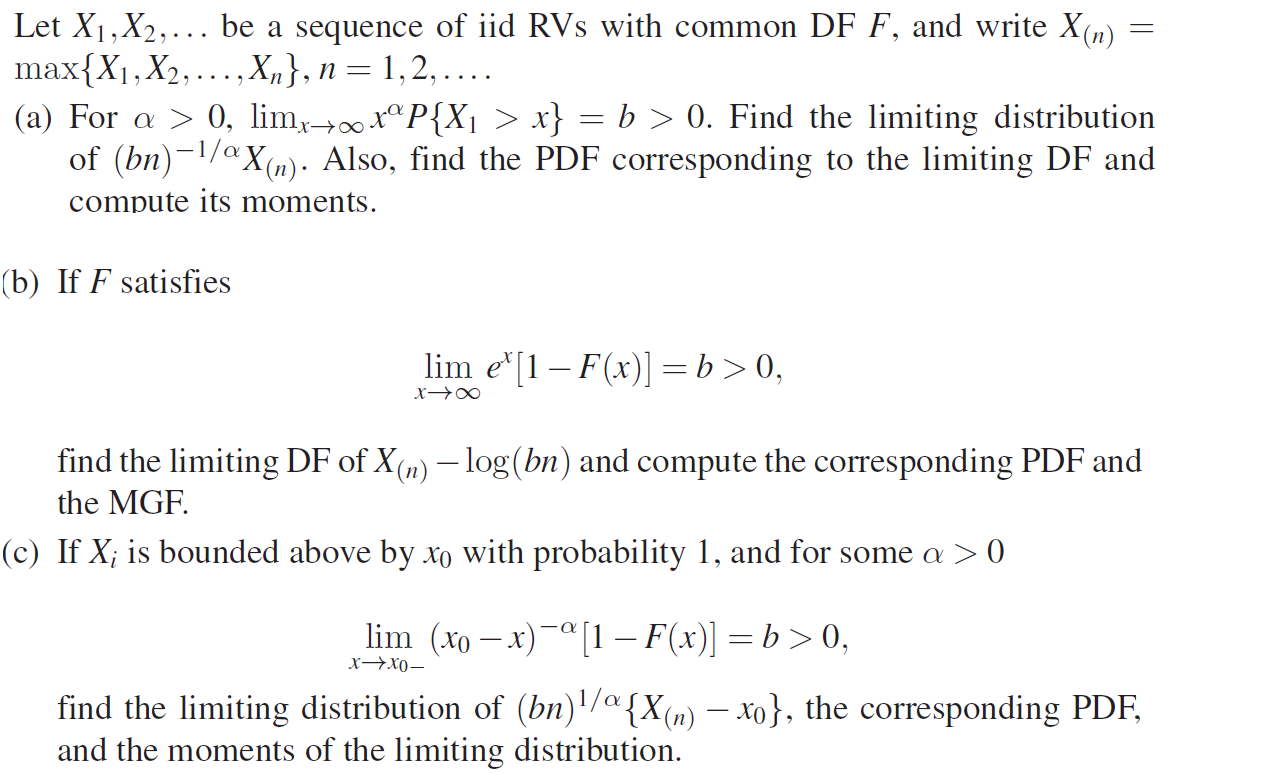let $\{X_n\}_{n\geq 1}$ be a sequence of i.i.d random variables with common distribution $F$, and write
$X_{(n)}=\max\{X_1,\cdots , X_n\}$ , $n=1,2,\cdots$
(a) for $\alpha >0$ , $\lim_{x\rightarrow \infty } x^{\alpha} P\{X_1 >x \}=b>0 $. Find the limiting distribution of
$(bn)^{-\frac{1}{\alpha}} X_{(n)}$
(b) if F satisfies
$\lim_{x\rightarrow \infty } e^{x} [1-F(x)]=b>0$
find the limiting distribution of
$X_{(n)} - \log(bn)$
(c) if $X_i$ is bounded above $x_0$ with probability 1, and for some $\alpha>0$
$\lim_{x\rightarrow x_0^{-} } (x_0-x)[1-F(x)]=b>0$
find the limiting distribution of
$(bn)^{-\frac{1}{\alpha}} (X_{(n)}-x_0)$
My try I got stuck in the part (a)
part (a)
$Z=(bn)^{-\frac{1}{\alpha}} X_{(n)} $
$F^{(n)}_Z(z)=P(Z\leq z)=P\bigg((bn)^{-\frac{1}{\alpha}} X_{(n)} \leq z \bigg)=F_{X_{(n)}}\bigg((bn)^{\frac{1}{\alpha}} z\bigg)=\{F_{X_1}\big((bn)^{\frac{1}{\alpha}} z\big)\}^n$
$=\{1-P\big(X_1>(bn)^{\frac{1}{\alpha}} z\big)\}^n$
$=\{1-\frac{ \big( (bn)^{\frac{1}{\alpha}} z \big)^{\alpha} }{\big( (bn)^{\frac{1}{\alpha}} z \big)^{\alpha}}P\big(X_1>(bn)^{\frac{1}{\alpha}} z\big)\}^n$
$=\{1-\frac{ \big( (bn)^{\frac{1}{\alpha}} z \big)^{\alpha} P\big(X_1>(bn)^{\frac{1}{\alpha}} z\big) }{\big( (bn)^{\frac{1}{\alpha}} z \big)^{\alpha}}\}^n$
$\rightarrow \{1-\frac{ b }{\big( (bn)^{\frac{1}{\alpha}} z \big)^{\alpha}}\}^n$ $\hspace{1cm}$ (1)
$=\{1-\frac{ b }{\big( (bn) z^{\alpha} \big)}\}^n$
$=\{1-\frac{ 1 }{\big( n z^{\alpha} \big)}\}^n\rightarrow e^{-\frac{1}{z^{\alpha}}}$
is this calculation is valid and what now? (if $X_n$ be a sequence of positive Random variables so $\frac{1}{z}\sim weibull(\alpha,1)$ , but $X$ is just continues variable).
and What is its application? any idea?
Update
in (1) I am not sure that
$\big( (bn)^{\frac{1}{\alpha}} z \big)^{\alpha} P\big(X_1>(bn)^{\frac{1}{\alpha}} z\big)$
can be replaced with $b$ so I do another way.
$F^{(n)}_Z(z)=e^{\log F^{(n)}_Z(z)}=e^{\log F^{(n)}_Z(z)}$
$=e^{\log\{F_{X_1}\big((bn)^{\frac{1}{\alpha}} z\big)\}^n}$ $=e^{n\log\{F_{X_1}\big((bn)^{\frac{1}{\alpha}} z\big)\}}$
define $t=(bn)^{\frac{1}{\alpha}} z$
$=e^{n\log F_{X_1}(t)}=e^{n\log F(t)}=e^{n\log(1- p(X>t))}$
$=e^{n \bigg( - p(X>t)-\frac{1}{2} p(X>t)^2- \frac{1}{3} p(X>t)^3 \cdots \bigg) }$ $\hspace{1cm}$ (2) Use Taylor series $\log(1-p(X>t))$
$=e^{ \bigg( -n p(X>t)-n\frac{1}{2} p(X>t)^2- n\frac{1}{3} p(X>t)^3 \cdots \bigg) }$
$=e^{ \bigg( -n p(X>(bn)^{\frac{1}{\alpha}} z)-n\frac{1}{2} p(X>(bn)^{\frac{1}{\alpha}} z)^2- n\frac{1}{3} p(X>(bn)^{\frac{1}{\alpha}} z)^3 \cdots \bigg) }$
$\rightarrow e^{ \bigg( -n p(X>(bn)^{\frac{1}{\alpha}} z)-0 \bigg) }$
$=e^{ -n p(X>(bn)^{\frac{1}{\alpha}} z) }$
$=e^{ -\frac{\big( (bn)^{\frac{1}{\alpha}} z\big)^\alpha}{\big( (b)^{\frac{1}{\alpha}} z\big)^\alpha} p(X>(bn)^{\frac{1}{\alpha}} z) }$
$\rightarrow e^{ -\frac{b}{\big( (b)^{\frac{1}{\alpha}} z\big)^\alpha} }$
$= e^{ -\frac{1}{ z^\alpha} }$
so
$\lim_{n\rightarrow \infty}F_{Z_n}(z) = \left\{ \begin{array}{cc} e^{ -\frac{1}{ z^\alpha} } & z\geq 0 \\ 0 & z <0 \end{array} \right. \sim weibull(\alpha,1)$

